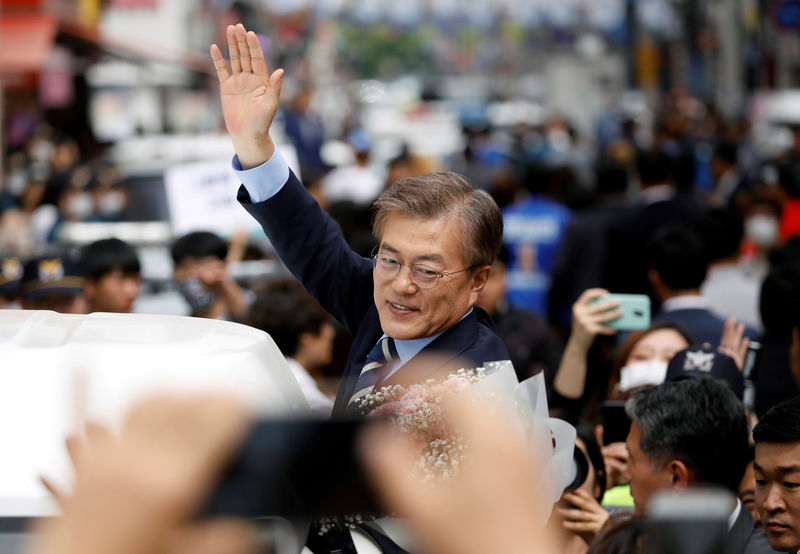By Christine Kim
SEOUL (Reuters) - The man tipped to be elected South Korea's new president has said he wants to hire more firefighters, teachers and policemen, but his main objective will be to protect a fragile recovery in Asia's fourth-largest economy.
Moon Jae-in is the favourite to win Tuesday's election and become the first liberal president in South Korea in nine years. But he seems unlikely to raise taxes or radically change policies followed by conservative governments, economists say.
Moon has hired conservative economist Kim Kwang-doo as his adviser for economic policy, and media have said he may be named prime minister or a senior cabinet minister in the new administration. Like Kim, some of Moon's other key advisers are also long-time advocates of tax cuts and lower regulations.
People who have worked closely with the Moon campaign say the presidential frontrunner will be careful not to hurt a fragile economic recovery. That implies no radical change in policies for now, which will be positive for markets.
But sticking with conservative policies may mean that Moon's plan for 500,000 new jobs per year could run into hurdles, affecting a key voter segment. More than 11 percent of people who are 15-29 years old and eligible to work were unemployed in March, much higher than South Korea's overall unemployment rate of 4.2 percent, according to Statistics Korea.
"Moon doesn't seem more liberal than other presidential candidates. I think at first he attempted to do something radical, but now he seems to have changed course, emphasising market stability," said Stephen Lee, chief economist at Meritz Securities.
"It looks like they're aiming for a soft landing."
Recent economic data show exports have been rising for six straight months while first quarter growth surged, prompting the central bank and government to upgrade forecasts.
In the 389-page election manifesto from Moon's liberal Democratic Party, only four pages are devoted to how his administration will raise money for new jobs and other welfare projects. Details are limited to vague descriptions, like "strengthening taxation for the rich" and "higher fines for unfair practices."
Moon, repeatedly asked by other candidates in several election debates how he will fund hundreds of thousands of new jobs, did not offer details or mention new taxes as a means.
Rather than broadly raising corporate and income taxes, Moon will focus on the super-wealthy and top corporate earners, his campaign advisers say.
"The basis for the policies is liberal, but the execution method is moderate. I think this is because (Moon's people) do not want to worry the mainstream public," said a high-ranking government official, who declined to be named. The official is part of a government team that examines candidates' pledges to plan ahead and prepare policy for a smooth handover.
PARK'S FORMER ADVISER
Kim, who has been spearheading Moon's economic plans, is a former adviser to conservative ex-president Park Geun-hye's campaign in 2012 who was responsible for her campaign pledges to cut taxes and relax corporate regulations.
Park was impeached in March over a corruption scandal.
Kim told Reuters in a recent interview he was courted by Moon last year to join his campaign and that he was moved by the frontrunner's "genuine heart" to revive the economy. Kim declined to comment for this story.
Kim, a professor at Sogang University, is frequently named in local media as a possible prime minister or other high-ranking Cabinet post. He did not take any official role in Park's administration.
Also helping Moon are Cho Yoon-je, former presidential economic adviser for Roh Moo-hyun who has served stints at the World Bank and the International Monetary Fund, and Kim Sang-jo, a professor who has been nicknamed "chaebol sniper" for his shareholder activist campaign in the past two decades. Chaebol refers to South Korea's powerful family-run conglomerates.
Cho is also known for his views that the economy should function centred on markets, not the government.
Both names have also appeared in media as strong candidates for top government positions.
Moon's economic team will have to maintain a still fragile recovery against growing protectionist policies in the United States and elsewhere, as well as tackling high youth unemployment, rising household debt and a rapidly ageing population.
In the wake of the political scandal in which Park was accused of receiving bribes from conglomerates, chaebol reform is also high on the agenda. Moon has promised to restrict the excessive power of the chaebol and boost shareholder-driven corporate governance, but it may not be as hardline as some expect since chaebol account for around half of South Korea's economy, according to some estimates.
"Moon has scaled down on his earlier hardline comments as he's been focussed on embracing more moderate voters. I don't think there will be a drastic change in the economy," said Yang Jun-seok, an economics professor at Catholic University.
To view graphic on South Korea's presidential election click on http://tmsnrt.rs/2p0AyLf

To view graphic on South Korea's election demographics click on http://tmsnrt.rs/2pGD25v